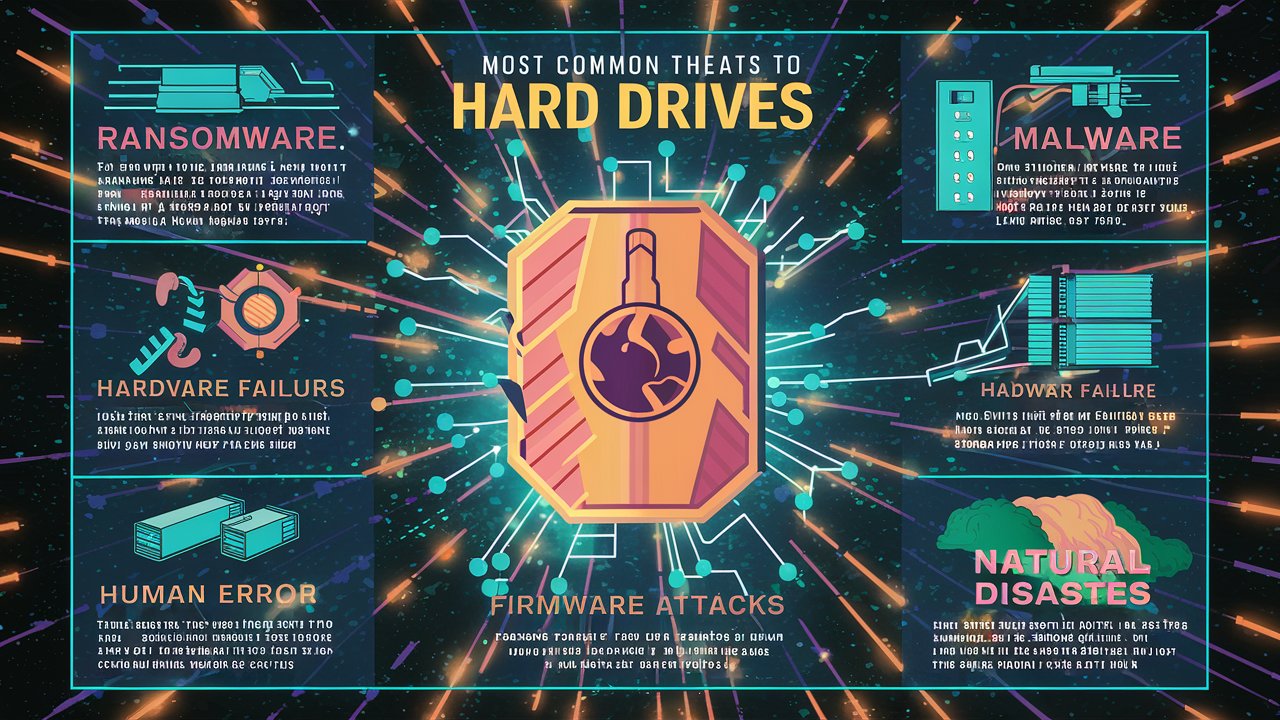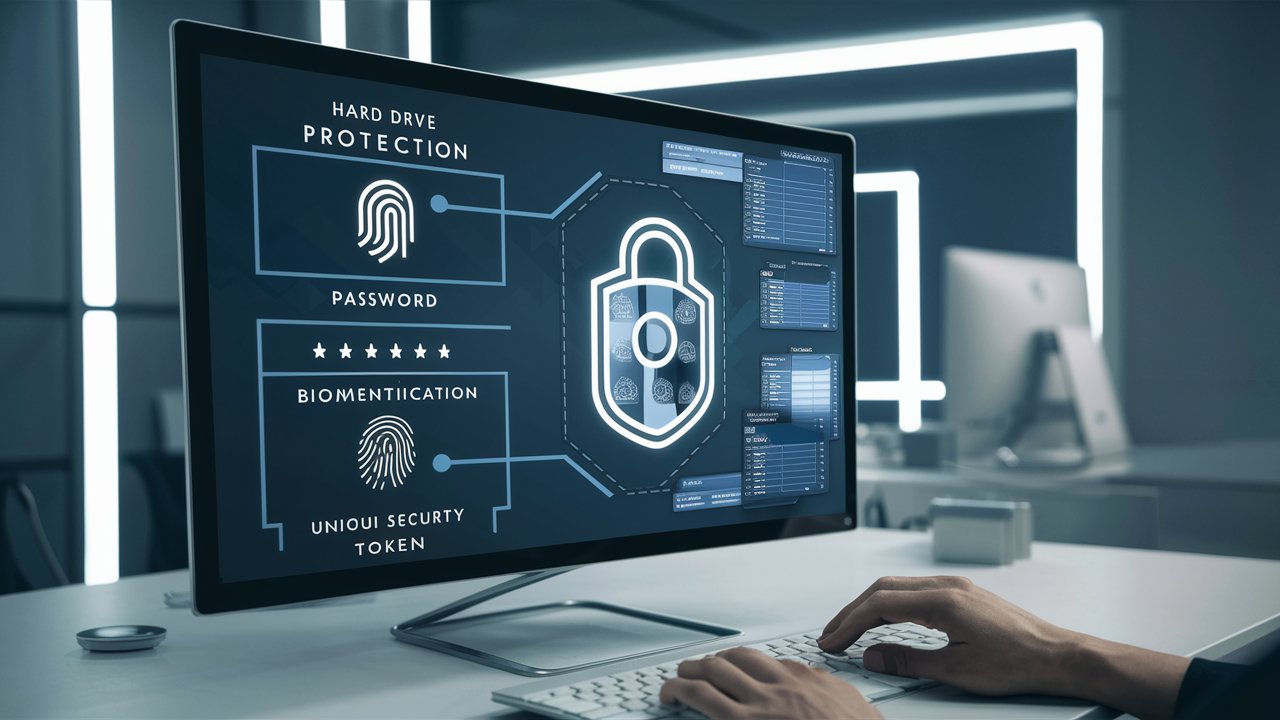Intro
In today's digital age, ensuring the security of your hard drive against malicious threats is more important than ever. With cyberattacks becoming increasingly sophisticated, it is crucial to have a comprehensive defense strategy in place to protect your valuable data. This guide will explore the most common cyber threats to hard drives and provide effective strategies to safeguard your information.

Identifying the Most Common Cyber Threats to Hard Drives
Our hard drives are the vaults that hold our digital riches in the context of digital security. They draw a variety of highly skilled attackers who are all out to compromise and compromise as a result. Malware is a well-known invader that sneaks into systems to alter or take control of data. Ransomware is just as frightening; it encrypts our digital assets and holds them hostage, threatening to destroy them until a bounty is paid. Phishing attacks utilize false lures to fool unsuspecting people into willingly giving up control of their digital kingdom. Meanwhile, social engineering tactics manipulate human trust and curiosity, exploiting them as vulnerabilities to gain unauthorized access. Recognizing these threats is the first step in fortifying our digital fortresses, arming us with the knowledge needed to thwart the advances of cyber adversaries. By identifying these common yet dangerous threats, we arm ourselves with the critical foresight required to construct a robust defense, ensuring our digital realms remain secure and sovereign.

Utilizing Multi-factor Authentication for Added Protection
In the pursuit of fortifying our digital sanctuaries, one cannot overlook the pivotal role of multi-factor authentication (MFA). This security measure serves as a dynamic bulwark, layering the entrance to our digital domains with multiple checkpoints. The essence of MFA lies in its demand for diverse evidence of identity—beyond the traditional password, it beckons for a code from a smartphone, a fingerprint, or even a retinal scan before granting access. This manifold verification process significantly diminishes the likelihood of unauthorized entry, as it complicates the attacker's mission to a near-impossible task.
Incorporating MFA is similar to deploying an advanced guard system that examines closely every entity attempting to cross the threshold into your digital territory. It's not merely about creating obstacles but about intelligently safeguarding the keys to your digital kingdom with a method that adapts to the user's context and current security landscape.
By embracing multi-factor authentication, you weave an additional layer of security into the fabric of your digital life, ensuring that your hard drive—and the invaluable data it houses—remains protected against the specter of cyber intrusion. This approach aligns with the principle that in the realm of digital security, the depth of your defenses profoundly influences the stronghold of your peace of mind.

Implementing Strong Encryption as a Shield
Encryption stands as an unwavering guardian in the landscape of hard drive security, transforming your data into an enigmatic puzzle only solvable by those who hold the key. This transformative process encodes your information, rendering it indecipherable to prying eyes and ensuring that, in the event of unauthorized access, your data remains a cryptic mystery. The strength of encryption lies in its ability to shield your data behind layers of complex algorithms, turning sensitive information into unreadable gibberish to anyone without the correct decryption key.
Embracing strong encryption is not just about putting up a barrier; it's about creating a dynamic defense mechanism that evolves with the security landscape. Whether you are safeguarding personal photos, sensitive work documents, or even casual correspondence, encryption is an indispensable tool in your digital armory. It’s crucial, then, to select an encryption standard that aligns with the highest security benchmarks, ensuring that the protective cloak around your data remains unbreakable.
By implementing robust encryption strategies, you effectively arm your hard drive against the myriad of threats lurking in the digital shadows, making it a fortress that stands resilient in the face of cyber onslaughts. This proactive approach to hard drive security underscores a commitment to safeguarding your digital life's most precious assets, ensuring they remain secure and sovereign in the digital expanse.
The Role of Antivirus and Anti-malware Solutions
Navigating the vast digital landscape, our hard drives are ceaselessly bombarded by an array of malicious entities, each more cunning than the last. Within this context, antivirus and anti-malware solutions emerge not merely as tools but as vigilant sentinels standing guard over our digital domains. These sophisticated guardians are adept at scanning the horizon for signs of intrusion, employing real-time detection mechanisms to identify and neutralize threats before they can breach our defenses.
The dynamism of these solutions lies in their relentless pursuit of security; they are continuously updated to counteract the ever-evolving tactics of cyber adversaries. By integrating these systems into our digital fortifications, we enhance our ability to preemptively address potential vulnerabilities, ensuring that our data remains under steadfast protection.
Moreover, the effectiveness of antivirus and anti-malware programs is magnified when coupled with regular system scans. This proactive measure ensures that any lurking threats, that might have slipped past initial defenses, are promptly identified and eliminated. It is this exacting attention to detail that fortifies our hard drives against the insidious advances of malware, viruses, and other digital marauders, securing our digital assets against the uncertainties of the cyber realm. In embracing these solutions, we empower ourselves with a robust layer of defense, ensuring that our digital sanctuaries remain inviolable amidst the chaos of the online world.

Adopting Smart Habits for Digital Hygiene
Cultivating robust digital hygiene is similar to nurturing a garden; it requires attention, consistency, and a proactive mindset. In the fertile digital landscape, where threats loom like weeds ready to breach the surface, establishing smart habits is paramount. This involves a meticulous approach to interactions within the digital realm—exercising caution with links and attachments, similar to distinguishing between the benign and the harmful. Each click should be as deliberate as selecting the right tool for the right job, avoiding the accidental opening of gateways for malicious entities.
Passwords, those critical keys to our digital estates, demand creativity and complexity. They should be as unique as one's signature, never replicated across different domains. This uniqueness serves as a line of defense, a personalized code that guards the entry to our digital vaults.
Furthermore, the software and operating systems that serve as the infrastructure of our digital habitats must be kept in prime condition through regular updates. These updates act like fortified walls, enhanced and reinforced to withstand the evolving tactics of cyber adversaries.
In the cultivation of these habits, we not only protect our hard drives from potential threats but also foster an environment where our digital selves can thrive securely. The commitment to digital hygiene is a continuous, perpetual cycle of learning and adapting that protects our digital sanctuaries from the chaotic elements of the cyber landscape.

Securing Your Hard Drive Through Regular Backups
Hard drive security is more than just protecting your data from attack; it's also about building a resilient plan with frequent backups. By doing this, you may effectively create a trustworthy echo of your data—a kind of dark web where your digital identity is safe from the turmoil of online threats. Creating a backup process for your important files guarantees a recovery path that will always be lit in case of data loss. This approach is strengthened even further by spreading your backup locations among multiple external hard drives, cloud storage providers, or both, creating a multi-layered barrier around your data. It's a proactive approach, readying yourself with a cool, collected determination in case of cyberattacks. By following this procedure, you create a security net that protects your digital heritage from future unanticipated storms while simultaneously protecting it against current dangers. Regular backups, therefore, represent the dedication and foresight that characterize a strong plan for digital preservation and serve as a cornerstone in the architecture of hard drive security.

Navigating the Future of Hard Drive Security
In the ever-shifting landscape of digital security, the horizon is always changing, announcing new challenges and threats that demand our unwavering attention and adaptability. The key to staying ahead in this dynamic environment is embracing a mindset of perpetual learning and vigilance. It’s about being attuned to the innovations in cybersecurity, integrating them seamlessly into our existing defenses, and always being prepared to recalibrate our strategies in response to emerging vulnerabilities.
Engaging with a community of cybersecurity experts and enthusiasts provides a valuable exchange of knowledge and insights, illuminating the path forward. This collective wisdom becomes a beacon, guiding our decisions and enhancing our ability to anticipate and neutralize potential threats. Moreover, fostering a culture of security awareness within our circles amplifies our defense mechanisms, creating a more resilient digital ecosystem.
As we chart our course through the evolving terrain of hard drive security, let us carry forward the lesson that the strength of our defenses lies not just in the technologies we employ but in our capacity for adaptation and our commitment to continuous learning. With these principles as our compass, we can navigate the future of hard drive security with a blend of confidence and caution, safeguarding our digital realms against the unforeseen adversities of tomorrow.